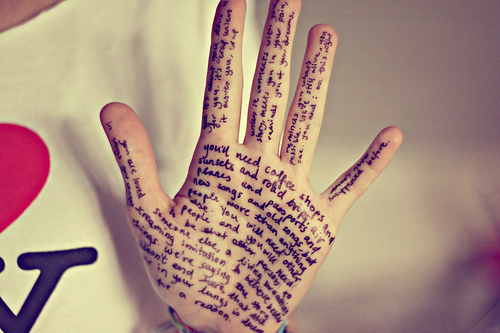Hook ‘Em on the First Cast
If you look at your first page checklist , you’ll see that the first three elements I discussed last week—introduction of your protagonist, a catalyst or incident to put them in that showcases her, and a hint of her core need (linked to her visible plot goal)—actually cover a few more things on the checklist. I haven’t talked about the hook, and rather than thumb through some great books and give you a long list, I would encourage you to do that and think about how effective these first lines are. But I will give you a couple of “catchy hooks” (sorry about the pun) that stick out in my mind (below).
Hook, Line, and Sinker
What is a hook all about anyway? It’s a line that snags your reader and pulls them into the story. Often someone flipping through your book or looking at the first page online at Amazon.com will just read the first few lines. I have heard agents and acquisition editors say that they will pretty much decide to either stop or continue reading based on that first sentence, or possibly the first paragraph.
Yikes! So, that first line should be a doozy and one that really makes an impression. As I said before, don’t get so hung up on writing that first paragraph that you don’t move forward. You will probably come back and rewrite it, unless you came up with an opening line ages ago and now you’re finally putting that masterpiece in place.
Sometimes as we’re writing our novel a great first line will come to us. Other times we’ll find a great first line somewhere on page three or four. When I went back in after completing my latest novel to chop away at my boring, extra-long first chapter (and this is usually the only chapter I do this with), I found a catchy, compelling first line on page two. I pretty much chopped out everything before it and started there. But, in the end, you will want a terrific first line.
A Couple of Great First Lines
That line should be intriguing, and if it doesn’t specifically name your protagonist, it should have a feel of being in her POV and something that’s important to her. I keep thinking of Harry Dolan’s first novel Bad Things Happen (that won one of the Amazon Breakthrough Novel Award contests). This is a suspense novel with intrigue and murder in a stylized voice that is refreshing and wonderful. Here’s the first line: “The shovel has to meet certain requirements.”
As you can see, it doesn’t introduce the protagonist, but it arouses curiosity. Why in the world is a novel opening with the discussion of a shovel? What will it be used for? The next lines in the first paragraph answer that question . . . to a point (pardon another pun): “A pointed blade. A short handle to make it maneuverable in a small space. He finds what he needs in the gardening section of a vast department store.”
Of course, the reader has read the blurb on the back cover so knows what the book is about and what the genre is. This type of opening is perfect for Dolan’s audience—mystery-suspense readers looking for something a bit noir or macabre. I think this is a great hook because it is full of microtension—meaning it raises your curiosity and gets you to wonder about this character and why he needs a shovel. Obviously the shovel must be important, and we suspect it will be used for something not related to gardening. And off we go, reading on.
Another great first line comes from The Lovely Bones by Alice Sebold. This story is told in first person, so it automatically introduces the protagonist through her voice. “My name was Salmon, like the fish; first name, Susie.” What the reader catches right away is the past tense: My name was Salmon. What? Did she change her name? You find out in the next line: “I was fourteen when I was murdered on December 6, 1973.” Right away we’re intrigued, as we realize this story is being told by a girl who is dead—and not just dead but murdered.
How about Richard Matheson’s great first line in I am Legend: “On those cloudy days, Robert Neville was never sure when sunset came, and sometimes they were in the streets before he could get back.” Here’s a perfect example of what I advised in my recent post stating what writers should have in that first paragraph (or sentence): an introduction of the protagonist, showing something of a conflict or inciting incident, and the character’s core need. Need I say more?
This week, play around with your first line, and if you’re brave, post it here and see what others think. If you have a few you are toying with, throw them out here for comment. Maybe that will help you hone it so it’s just the right opening line for your book. And feel free to share some more great first lines here, for the record!












I’ll weigh in with a variation on your rules. As a writer of thrillers under my pen name, Lior Samson, I often use a prologue to draw the reader in by way of a piece of the deeper back-story, the intrigue that undergirds the main arc of the plot. As such, I am sometimes introducing not THE protagonist but another character, central to the plot and connected with the protagonist but not the main character. I picked up the idea from a few other thriller writers (Dan Brown among them) and have made it my own with some signature variations. The fact that it is a prologue in some way signals to the reader that this is not the story itself but stage-setting or commentary.
For example, the opening sentence of Web Games, a thriller involving a cyber-attack on the U.S., begins with a peek at a figure who remains shadowy for much of the book and whose work and allegiances are unclear at first:
“FROM HIS OFFICE WINDOW, Gaijin could look down over the East Gardens of the Imperial Palace and see the Sapia Tower at the JR Central Railroad Station in the distance, but tonight the blinds were drawn to the dazzling lights of Tokyo, and the tiny office was lit only by the glow of the twin LCD computer monitors on his desk.”
Yeah, yeah, I know it is a long sentence, but I think it parses easily and naturally. And I confess to love writers who can pull off this trick, so I tried it, at least in that case.
For another example, with a two-beat, punchy opening sentence, I offer the prologue of Bashert, my first novel and the one that has made it into the upper ranks of Jewish Fiction on Amazon. It begins with one of three characters who form a truly unique love triangle and for whom each of the three parts of the book are named. (I’m cheating and quoting two sentences.)
“THE DOOR WAS UNMARKED. Every other door along the gray-green basement corridor had a number, as did, to the best of Mitchell Rossing’s knowledge, every door to every office, lecture hall, bathroom, or storage closet anywhere on campus.”
Hmmm, I hope the reader is saying, what is this about? Who is Rossing, why is he here, and what is behind the door? I guess it must have worked, because the book keeps selling better and better.
–Larry Constantine (Lior Samson)
Larry, you would lose me on the long first line, for it’s all about location, which normally doesn’t interest me, and tells me little about the character and what his problem is. The emphasis in the sentences is on the fact the office is only lit with a small glow, and that isn’t going to hook your readers. The second example you give has a bit of mystery with the unmarked door and so might make readers want to know more, and if you gave more of your character’s reaction to that fact, that would be better as it would reveal more about him rather than about the setting.
Below is the first two sentences of a book I have started – only finished the first draft of Chapter 1 and a little of Chapter 2. Hope people like it. At the moment it is called Starlight Dragons – that may change.
“The setting sun made Starlight’s hair glow with fire. If anyone had been watching they might have taken it as a sign, but no-one was and she was completely unaware of the effect.”
Thanks for sharing this. The problem here is you are really speaking from an omniscient point of view. If you can, you want to be in your character’s head right from the start. And a character can’t be “unaware” of anything. It almost feels like there is someone else seeing Starlight and they are thinking this could be a sign. But if you want to reveal character and hook the reader to start caring about him/her, think about having a first line be about something the character can react to personally. Make sense?
Here is my first line:
The two lifeless eyes staring up at her were different shades of blue.
You might want to name your character by name “staring up at ___” and then give some reaction to what she sees. She sees the lifeless eyes and how does she react? The more odd and perplexing her reaction, the more you will hook your reader. Like “the two lifeless eyes staring up at Alice Jones were different shades of blue, which made Alice chuckle.” Of course, I don’t know the story, but that’s what you might aim for.
Yikes…I have not been doing this and I’m going to change the way my current WIP starts. I’ll come back and share my first sentence when I’m done. Thanks for the advice and it makes loads of sense.
First line of my current WIP: “Despite our falling out, I’ve always loved Agnes like a mother.”
At the moment, this is a single page, short story that I conjured up as I was running with my dog one night.
Their evening run started out as their evening runs always had, the girl changing from her work clothes into her running clothes, the dog excitedly waiting for the moment when they stepped out the door. A mile or so into their run, the light on the dog’s collar went out – and in that moment the girl saw that they did not run alone but with a pair of shadowy partners.
It’s still early days for my work, but I’m debating between two approaches to the opening (or maybe neither is a go – look forward to feedback):
Congo Red is the colour of dye used to diagnose my strange illness.
or
“I have the results back,” the internist informs me, looking at the floor.
Back in the day you’d get a whole paragraph. Like the one that starts: “I first heard Personville called Poisonville by a red-haired mucker named Hickey Dewey in the Big Ship in Butte. He also called his shirt a shoit. . . ” or (same author) “Sam Spade’s jaw was long and bony, his chin a jutting v under the more flexible v of his mouth . . .He looked rather pleasantly like a blond satan.”
Here’s mine: “I met her at a racetrack, Elmwood Park, where I’d been taken by some friends. First and last time, promise.”
And another: “You don’t like it — but maybe you do.”
These that I like all seem to have reversals, pose questions, beg explanation of complications. One more favorite: “TRUE! nervous, very, very dreadfully nervous I had been and am; but why WILL you say that I am mad?”
I agree with Wendy, Yikes. Like the one line pitch for a book, the first line has the opportunity to present so many questions to a prospective reader. Think, think, think, I tell myself, like Winnie the Pooh.
The opening sentence in a novel is the most important, IMO.
The first line in my latest novel, The Celibate Mouse, is :
“There is no mistaking the crack of a high-powered rifle.”
The opening line in the third of the Detective Senior Sergeant Susan Prescott trilogy will probably be:
“He shouldn’t have squeezed the baby.”
Roland woke slowly in the bridal bed, conscious first of his cock,second of his new wife, Eloise, sleeping tenderly at his side,and third, with ever increasing annoyance, the need to pee, bringing him back to his cock.
First line in the second book of a series, which I reworked for hours after reading this blog 😀 Now it kind of reads like mega-flash fiction.
My problem with this outlook (one sentence? Can’t you give me a paragraph to interest you?) is that it produces gimmicky, downright manipulative openings. I don’t want to be a hapless fish impaled with a hook. I want to join an author in a journey.
Some of the most memorable openings in literature would not win a first line contest today. “Last night I dreamt I went to Manderley again.” A dream? Where’s the action? And what would an editor/agent say to Miss Austen? “It is a truth universally acknowledged, that a single man in possession of a good fortune…yadda, yadda, yadda.”
Okay, I’ve got that off my chest. Not trying to be refractory. Carry on. 🙂
Well, most first lines aren’t all that memorable, and back in the day, no one cared. Unfortunately today, many agents and editors (I’ve heard them say this in workshops and panels) will stop reading aftert the FIRST line. It’s not fair, but there it is. At my Donals Maass workshop he said he would read the second line if the first seemed to maybe hold some interest, but that second line had to grab him. But, I agree–I feel overall a dynamite first paragraph will do the trick and should contain all it needs to get the reader wanting more.
I know you’re right. I just have to whine sometimes. Now I’ll go rework my first paragraph…again.
Thank the lord 2011 is over. What a hellish year. I set out the year telling people, ‘this is the year I’m going to get married.’ People said, ‘great. To who?’
This is still very much a work in progress but it’s a story of a woman who’s on a mission to fix her love life …
I have started my second book as an outrageous dream that I hope will be enough to captivate the reader into reading the rest of the first chapter. And then hopefully by that time, they’ll be motivated enough to finish the whole book! 😉
Here is my opening line for a short story. This line is really part of a three-paragraph prologue, followed by the actual opening scene where the characters are introduced. It is a “flash forward” rather than “flash back” effect.
It began as a nasty prank. It rapidly turned into something worse.
“Paizely?” It’s her voice, but that’s impossible. She’s dead.
Or,
The mudroom door opens, and Steve, the love of my little sister’s life, steps into the kitchen.
–From PASSAGE, a Paranormal Suspense. Thank you for your thoughts and for such a great blog. Very helpful!
Love that first line, since it adds great mystery and sets up the impossible. The second line doesn’t really do much since we don’t know your characters yet and there’s no emotional trigger in the fact of someone walking into a kitchen. If you said “Steve, the recently deceased love of my sister’s life,” well then, there would be the intrigue.
Thanks so much for the feedback, I thought the same thing. Tweaking never ends, does it? 🙂
First line? Mine is:
It was advertised as “Brand New With Tags- the Bag That Broke a Relationship”.
Hi, here are two openings:
1. Preface – a ‘flash forward’
– I always had an idea I was different – strange somehow. –
2. Chapter 1
– Three days to go before New Years Eve, before my eighteenth birthday. *And the same as every other one which proceeded this mammoth event I would’ve been dreading the arrival but, different issues now played with my thoughts.
*Thought I’d add the second sentence just out of interest.
Don’t know if either fit the bill, but I’d love to get your opinion on them all the same.
Sarah.
The more you can add some mystery to your opening and hint at something happening ( a little more in particular), that will help. Saying “I was different” is great, but can you add more to it to hint how in a way that will grab the reader? The second line for chapter 1 doesn’t really have anything that adds that microtension, so maybe think of putting in something about what happened that day that made it important or strange. Thanks for sharing!
105k words into my MS, I thought I had it nailed. But I felt this recurring sadness, re. my opening. I have just written a replacement first chapter which is so far removed from what it was, I now need to re-structure the whole bloody book…
Here are the opening two sentences…
“Lancaster’s ^&(*&(^*^ of one-way tarmac is sucked under my wheels with speed, too much speed, as my eyes hunt for a sign to the hospital. It is four in the morning, at least it was the last time I felt safe enough to look at the clock; it’s probably closer to half-past by now.”
Am I happy? Definitely happier.
Hi,
What a great article! Some excellent advice there, and I’d like your view on my opening line for a paranormal fantasy romance I’ve just started.
“There was something in the stare of the one-eyed man that told Abby his proposal was serious.”
What do you think? 🙂
This has a lot of intrigue. I like it! Anything that raises questions is good, and then the rest of the paragraph can give a few more hints of the situation and who Abby is, what she is doing, and where.
Thanks!
Love your blog! Awesome that you give so much valuable information away for free. Purchased your 12 key pillars book and working threw it now.
Changed up my opening scene because of this article, would like your thoughts on the following first lines if you’re still giving feedback.
“Be careful to limit your exposure to them” Tom said to his recruits as he made eye contact with each of them driving home how serious the instruction was. Lowering his head and speaking just above a whisper he said “even the strongest have been lost.”
Thanks! That’s a catchy opening. Think about avoiding those participial phrases as they can be clunky. Instead: “He lowered his head and spoke just above a whisper … You’d want the next couple of lines to establish some of the setting, and Tom’s mind-set to reveal what he is most concerned about.
Thanks for such a quick reply….your feedback is very helpful, though I think I actually have more questions now than before your reply 🙂
I will be contacting you about your services soon, thanks again!